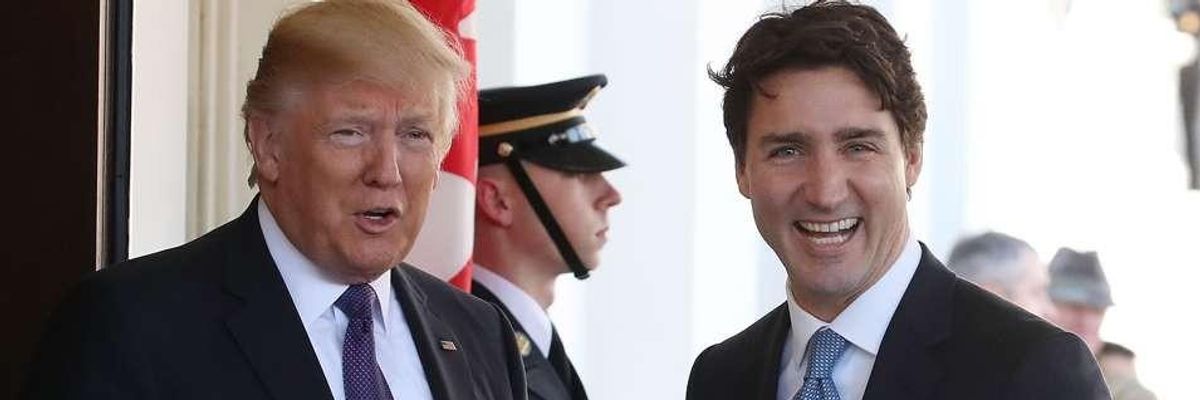U.S. President Donald Trump's climate criminality has been shocking. His administration's contribution to worsening this existential threat to humanity will be remembered as his most damaging policy.
Largely in response to the president's "spew more fossil fuels" outlook Noam Chomsky described Trump as "the worst criminal in human history." Pressed on the matter, Chomsky recently told the New Yorker that Adolf Hitler "was an utter monster but [he was] not dedicating his efforts perfectly consciously to destroying the prospect for human life on earth."
So why is Ottawa trying to maintain one of the Republican's worst environmental policies?
Incredibly, the Trudeau government's immediate reaction to US voters rejecting Trump was to press the president-elect to break a direct promise and maintain the worst of the Donald. Soon after Biden was declared winner Foreign Affairs Minister Francois-Philippe Champagne told CBC that persuading the incoming president to build the Keystone XL Pipeline was at the "top of the agenda" for Canada.
As the first global leader to talk to President-elect Joe Biden on Monday, Prime Minister Justin Trudeau raised a pipeline that would ship more than 800,000 barrels of heavy carbon emitting crude a day from Alberta to the US. In response to the Trudeau government's bid to maintain the worst of Trump, Bill McKibben wrote to 350 Canada's list, "It's truly unacceptable that the Trudeau cabinet's top agenda item is to weaken Biden's position on climate."
Under intense pressure from indigenous and environmentalist groups President Barack Obama denied TransCanada the permit for Keystone XL. But, immediately upon taking office Trump signed an executive order allowing the pipeline. In 2018 a federal court judge in Montana halted the project after concluding the US State Department hadn't properly considered the pipeline's environmental impact. In response, Trump signed a new order last year that bypasses the judge's ruling and granted permission for construction.
During the election Biden promised to cancel Keystone XL within his first 100 days in office. But now the Trudeau government, Alberta and other oil interests are pressuring Biden to break his promise. This is not an idle threat. In response to a question on the matter Alberta's lead representative at the Canadian Embassy in Washington, James Rajotte, told the CBC on Monday that he's already lobbying aggressively on the matter. The Stephen Harper government established an oil sands advocacy strategy that, noted Globe and Mail columnist Jeffrey Simpson, "put Canada's entire diplomatic apparatus in the US behind the Keystone campaign." In a 2011 series dubbed the "The War for the Oil Sands in Washington" The Tyee described the intensity of Canadian lobbying efforts on behalf of Keystone XL. One congressional aide compared Canadian officials to "aggressive" car salesmen. It "was the most direct encounter I've had with a lobbyist representing a foreign nation," a congressional staffer told the Tyee. Canada's 22 consular offices in the US were ordered to take up the Keystone cause.
The Keystone XL decision is in keeping with Trudeau's support or indifference towards Trump's climate policy. While Trump was "dedicating his efforts perfectly consciously to destroying the prospect for human life on earth", Trudeau sought to avoid conflict with the president over his administration's climate criminality. Spiegel Online reported that the Canadian prime minister rejected a proposal by Chancellor Angela Merkel to support a German initiative at the 2017 G20 summit to pressure Trump on climate change. The Liberals also refused to commit Canada to improved automobile fuel mileage standards the Obama administration negotiated with the auto industry. Against the wishes of even some carmakers, Trump announced the US would freeze planned fuel-economy targets at 2020 levels, which prompted a bitter battle with California and a number of other US states. With Canada, the collection of dissident states represented 40 per cent of the North American auto market, enough to push the (divided) auto industry to follow the previously agreed fuel mileage standards. But the Liberals failed to publicly commit to push forward with steadily improved fuel mileage standards.
Despite claiming to take the climate crisis seriously, the Trudeau government has failed to put the country on track to meet even dangerously insufficient targets for reducing greenhouse gas emissions. Expansion of the tar sands guarantees that Canada will flout its international commitments to reduce GHG emissions.
As the climate crisis worsens, it's outrageous that Trudeau would press the president-elect to break his promise to voters and maintain the worst of Trump. Makes one wonder what level of climate criminality posterity will assign to the current Canadian prime minister.

